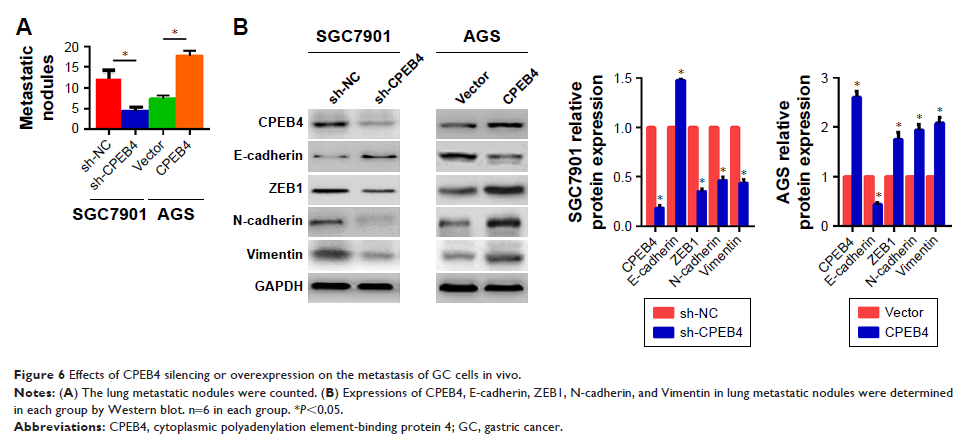9 0 8 0 2
论文已发表
注册即可获取德孚的最新动态
IF 收录期刊
- 2.6 Breast Cancer (Dove Med Press)
- 3.9 Clin Epidemiol
- 3.3 Cancer Manag Res
- 3.9 Infect Drug Resist
- 3.6 Clin Interv Aging
- 4.8 Drug Des Dev Ther
- 2.8 Int J Chronic Obstr
- 8.0 Int J Nanomed
- 2.3 Int J Women's Health
- 3.2 Neuropsych Dis Treat
- 4.0 OncoTargets Ther
- 2.2 Patient Prefer Adher
- 2.8 Ther Clin Risk Manag
- 2.7 J Pain Res
- 3.3 Diabet Metab Synd Ob
- 4.3 Psychol Res Behav Ma
- 3.4 Nat Sci Sleep
- 1.9 Pharmgenomics Pers Med
- 3.5 Risk Manag Healthc Policy
- 4.5 J Inflamm Res
- 2.3 Int J Gen Med
- 4.1 J Hepatocell Carcinoma
- 3.2 J Asthma Allergy
- 2.3 Clin Cosmet Investig Dermatol
- 3.3 J Multidiscip Healthc

CPEB4 通过 ZEB1 介导的上皮 - 间充质转换促进胃癌细胞的生长和转移
Authors Cao G, Chen D, Liu G, Pan Y, Liu Q
Received 26 May 2018
Accepted for publication 5 July 2018
Published 21 September 2018 Volume 2018:11 Pages 6153—6165
DOI https://doi.org/10.2147/OTT.S175428
Checked for plagiarism Yes
Review by Single-blind
Peer reviewers approved by Dr Colin Mak
Peer reviewer comments 2
Editor who approved publication: Dr Sanjeev Srivastava
Background: Cytoplasmic polyadenylation element-binding protein 4 (CPEB4) has
previously been reported to be associated with biological malignancy in various
cancers. However, its function in tumor growth and metastasis in gastric cancer
(GC) remains obscure. Here, we explored the functional and molecular mechanisms
by which CPEB4 influences GC.
Materials and methods: The expression of CPEB4 was assessed using Western blot and
immunohistochemistry in GC specimens. The roles of CPEB4 in GC cell
proliferation, migration, and invasion were investigated by cell-counting kit-8
(CCK-8), colony formation, and EdU assay; wound-healing assay; and transwell
assay, respectively. Quantitative real-time PCR (qRT-PCR), Western blot, and
immunofluorescence staining were performed to detect the expressions of CPEB4
and epithelial–mesenchymal transition (EMT)-related markers. The function of
CPEB4 on GC cell growth and metastasis was also determined in vivo through
establishing subcutaneous xenograft tumor and lung metastatic mice model.
Results: The results revealed that the expression of CPEB4 was increased in
GC tissues compared with matched normal tissues. High expression level of CPEB4
was significantly associated with clinical metastasis and unfavorable prognosis
in patients with GC. Furthermore, CPEB4 silencing remarkably inhibited GC
cells’ proliferation, invasion, and metastasis in vitro and in vivo.
Conversely, CPEB4 overexpression achieved the opposite effects. Mechanically,
we proved that ZEB1-mediated EMT might be involved in CPEB4-facilitated GC
cells’ proliferation, invasion, and metastasis.
Conclusion: Our findings implied that CPEB4 expression predicted a worse
prognosis in patients with GC. Besides, CPEB4 contributed to GC cells’
proliferation, migration, and invasion via ZEB1-mediated EMT.
Keywords: CPEB4, gastric cancer, epithelial–mesenchymal transition
